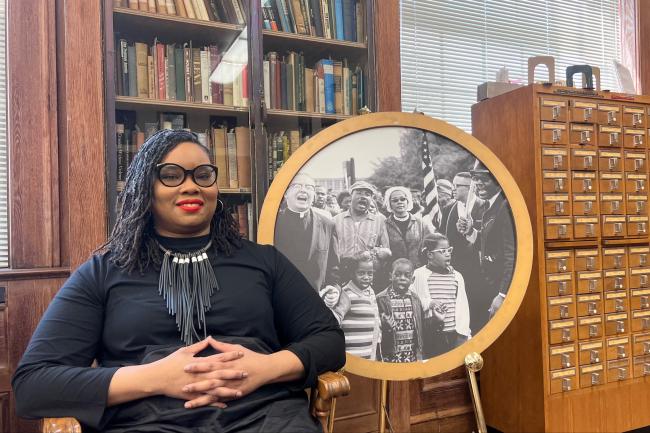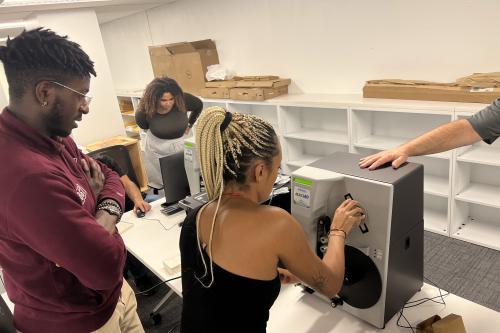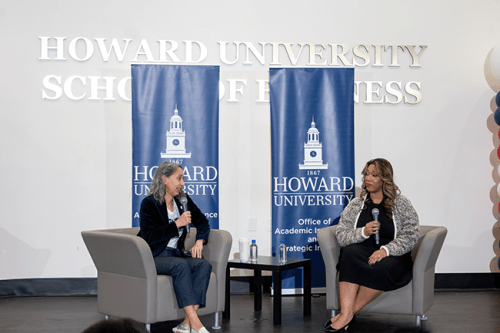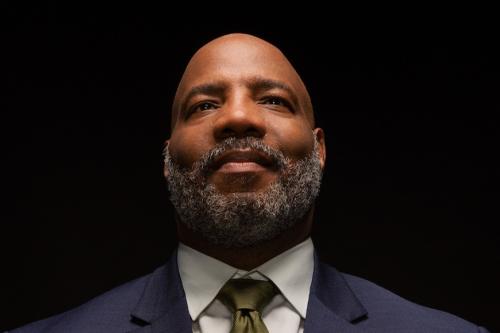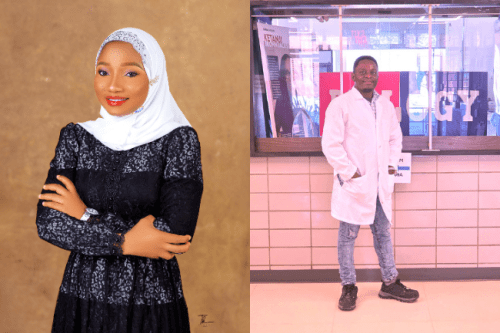At her core, Christina Vortia is the typical Black girl book lover, a fan of the historic librarians who preserved that authenticity of the Black experience. And now she is Moorland-Spingarn Research Center’s first rare books librarian in over a decade.
As a rare books librarian, Vortia will also be working with MSRC’s partners like the Library of Congress to assist with the preservation process.
“We’re handing these really incredible artifacts and books every day, I get chills because just because of the incredible experience this is,” Vortia says of her hiring. “With working with young people, what I really want to do is bridge that gap. I want young people to know that our ancestors collected and preserved all these things for you. They've done this work for you. This belongs to you.”
MSRC’s chief librarian Sammie Johnson oversaw the hire of Vortia. The two previously met as students at Tuskegee University. The professional library community is small, so Vortia and Johnson kept close contact through mutual networks, conferences and special events related to their profession.
Johnson referred to the rare books section as “intimate,” prompting a search for a librarian who could master a nuanced style and voice to the collection. The goal, Johnson says, is to preserve books well enough that the next generations’ leaders can access these resources, including scholars who access MSRC across the country and around the world.
“We are coming into this space with these incredible resources and looking at how do we preserve our collection,” Vortia says. “How do we restore parts of our collection that, maybe no one has seen or touched in a while?”
She cites Dorothy Porter Wesley, the MSRC’s founding librarian, curator and bibliographer, as an inspiration and shining example of a librarian dedicated to the practice of book preservation. Porter Wesley is the first Black women librarian to receive a library science degree from Columbia University in 1931. Vortia aims to “stand in the footsteps” of those who served, too.
“With working with young people, what I really want to do is bridge that gap. I want young people to know that our ancestors collected and preserved all these things for you. They've done this work for you. This belongs to you.”
Vortia also looks to color in some of the University’s artisans and writers too. She remembers an event that honored Chadwick A. Boseman last semester, where she realized the thespian’s broader works in poetry, fiction and other avenues of authorship.
“Even as (Boseman) continued into his fame, he continued to work quietly behind the scenes, helping edit his friends’ works and doing all of these wonderful collaborations, so out there in the universe are these secret writings of Chadwick Boseman,” Vortia recalls. “Chief Johnson quickly and smartly got up to the podium and asked, ‘How can we get that collection at the Moorland?’ Because our history is living.”
Vortia’s specialized work with student engagement in Hillsborough County Public Schools in Tampa, Florida also prompted her into the position. Vortia served on the board for the John Newbery Award and the Coretta Scott King Book Award.
During the first practices of virtual learning during the pandemic, Vortia served as a media specialist and brainstormed events created to keep young students reading through a daily CCTV morning show, a hybrid learning dynamic within the nation’s seventh-largest school district.
“I loved her background with her creativity and working with students and getting them engaged and I thought that was something that will be a benefit here at Howard,” Johnson says.
Vortia also acknowledges that she assumed this position of leadership in a concerning time for books, censorship and the accurate depictions of Black history. The current wave of Book bans took its first footing in Republican states such as Florida, prompting Vortia to take a stand in the Tampa area.
But the bans have larger consequences. Another key initiative of Vortia’s work is media literacy. While working with youth, she witnessed young students’ minimal use of library book resources or research databases for assignments. She stresses the dangers of using the internet and the internet only as reliable data and hopes students tap the MSRC’s rare books collection as a contextual, credible source for their topics.
Both Vortia and Johnson agreed to the dangers of limited access to Black history, dilutes narratives that are important to modern Black history and events tied to the overall identity and experience of Black Americanness. Vortia strives to preserve and hold collections at the Moorland-Spingarn Research Center that clarifies the innerworkings of the Black experience.
“As the largest repository of the global black experience, the Moorland-Spingarn Research Center captures an incredible treasure trove of the intellect and brilliance of black people all over the world history thought by non-black people not to have any significance in the world,” Vortia says. “Our collection proves that this has never been true and every day of the year that resilience needs to be celebrated.”


